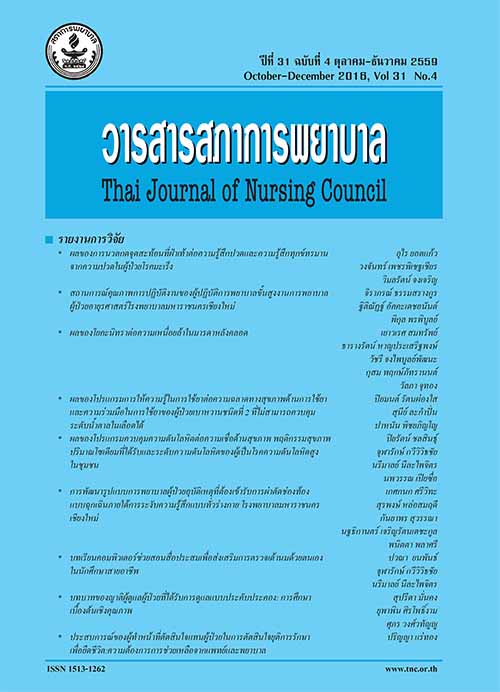ผลของโปรแกรมควบคุมความดันโลหิต ต่อความเชื่อด้านสุขภาพ พฤติกรรมสุขภาพ ปริมาณโซเดียมที่ได้รับ และระดับความดันโลหิต ของผู้เป็นโรคความดันโลหิตสูงในชุมชน
Keywords:
โปรแกรมควบคุมความดันโลหิต, ความเชื่อด้านสุขภาพ, พฤติกรรมสุขภาพ, โรคความดันโลหิตสูง, blood pressure regulating programme, health beliefs, health behaviour, hypertensionAbstract
บทคัดย่อ: วัตถุประสงค์ของการวิจัย: เพื่อศึกษาผลของโปรแกรมควบคุมความดันโลหิต ต่อความเชื่อด้านสุขภาพ พฤติกรรมสุขภาพ ปริมาณโซเดียมที่ได้รับ และระดับความดันโลหิตของผู้เป็นโรคความดันโลหิตสูงในชุมชน
การออกแบบงานวิจัย: การวิจัยกึ่งทดลอง ศึกษาสองกลุ่ม วัดผลก่อนและหลังการทดลอง
การดำเนินการวิจัย: คัดเลือกตัวอย่างตามเกณฑ์คัดเข้า จำนวน 64 คน แบ่งเป็นกลุ่มทดลอง
34 คน และกลุ่มควบคุม 30 คน กลุ่มทดลองได้รับโปรแกรมควบคุมความดันโลหิต ประกอบด้วย
กำรให้ความรู้โดยใช้วิดีทัศน์ และแบบจำลองจำนวนจานอาหารสุขภาพ พร้อมแจกคู่มือกำรบริโภคอาหาร
จานเดียวและแผ่นพับเรื่องอาหารแลกเปลี่ยน ร่วมกับการติดตามเยี่ยมบ้าน 3 ครั้ง กลุ่มควบคุมได้รับการดูแลตามปกติ เก็บรวบรวมข้อมูลโดยใช้แบบสอบถามข้อมูลส่วนบุคคล ความเชื่อด้านสุขภาพพฤติกรรมสุขภาพเพื่อควบคุมความดันโลหิต และแบบบันทึกการรับประทานอาหารย้อนหลัง 24 ชั่วโมง วิเคราะห์ข้อมูลโดยใช้สถิติบรรยาย paired t-test และ independent t-test
ผลการวิจัย: พบว่า กลุ่มทดลองภายหลังได้รับโปรแกรม มีคะแนนความเชื่อด้านสุขภาพเพิ่มขึ้น
กว่าก่อนทดลอง และมากกว่ากลุ่มควบคุมอย่างมีนัยสำคัญทางสถิติ (p<.001) มีพฤติกรรมสุขภาพดีขึ้น
(p<.01) และมีค่ำเฉลี่ยของระดับความดันโลหิต น้อยกว่าก่อนได้รับโปรแกรมอย่างมีนัยสำคัญทางสถิติ
(p<.05) รวมถึงมีปริมาณโซเดียมที่ได้รับน้อยกว่ากลุ่มควบคุมอย่างมีนัยสำคัญทางสถิติ (p<.05)
ข้อเสนอแนะ: นำโปรแกรมควบคุมความดันโลหิต ไปใช้กับผู้เป็นโรคความดันโลหิตสูงในชุมชน เพื่อควบคุมโรคและป้องกันกำรเกิดภาวะแทรกซ้อน
Abstract: Objective: To examine the impact that a blood pressure regulating programme had on the health beliefs, health behaviour, amount of sodium intake and levels of hypertension in community members with hypertension.
Design: Two-group experimental research with a pre-test and a post-test.
Implementation: This study was based on 64 subjects sampled based on the inclusion criteria, with 34 assigned to the experimental group and 30 to the control group. Whilst the control group received standard care, the experimental group was administered the blood pressure regulating programme, which comprised (1) video-mediated education sessions; (2) models of healthy dishes; (3) tips for consuming one-dish meals; (4) food-exchange pamphlets; and (5) 3 home visits. The data collection instruments were (1)a questionnaire designed to collect personal information, health beliefs, and health behaviour for blood pressure control; and (2) a form for recording food intake during the previous 24 hours. The data were analysed using descriptive statistics, paired t-test and independent t-test.
Results: The study showed that after participating in the programme, the experimental group achieved a signifcantly higher health belief score (p < .001), displayed signifcantly improved health behaviour (p < .01), and had a signifcantly reduced blood pressure level (p < .05). Compared with the control group, the experimental group scored signifcantly higher on health beliefs (p < .001) and showed a signifcantly lower level of sodium intake
(p < .05).
Recommendations: It is recommended that this blood pressure regulating programme be applied to the treatment of hypertension in local community members as a means of disease control and as a prevention of complications.








